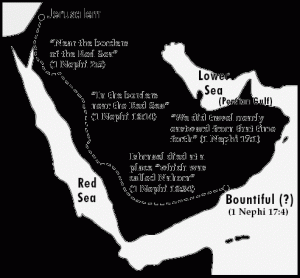Posts Tagged ‘scripture’
“And we did come to the land which we called Bountiful, because of its much fruit and also wild honey; and all these things were prepared of the Lord that we might not perish. And we beheld the sea, which we called Irreantum, which, being interpreted, is many waters.
And it came to pass that we did pitch our tents by the seashore; and notwithstanding we had suffered many afflictions and much difficulty, yea, even so much that we cannot write them all, we were exceedingly rejoiced when we came to the seashore; and we called the place Bountiful, because of its much fruit.
And it came to pass that after I, Nephi, had been in the land of Bountiful for the space of many days, the voice of the Lord came unto me, saying: Arise, and get thee into the mountain. And it came to pass that I arose and went up into the mountain, and cried unto the Lord.”
More than 8 years of struggling in the wilderness, starving at times, barely subsiding on the land, and more particularly, having little to no fruit because they were traveling through a desert. No wonder they are thrilled to arrive at the sea. Precious water! Trees that bear fruit!
To put it into perspective, they probably still had it better back in Jerusalem, but by this time any hopes of returning had long past. This land was truly a Bounteous land for them, providing some level of comfort from their long journey. However, this was not the promised land. They had to move on, perhaps through more or worse trials. It would have been very tempting for them to just stay put, especially given the fact that they had run out of land to walk on. Read the rest of this entry »
“And we did sojourn for the space of many years, yea, even eight years in the wilderness.”
I find it hard to keep in perspective that Lehi and family were traveling in the wilderness desert of Arabia for 8 years. It always seems that they went quickly from Jerusalem to the American continent; but it took more than 8 years, because once arriving in Bountiful, they stayed there for a while, at least long enough to construct a ship, which probably took nearly a year.
We need to keep in mind that they were not just walking with a backpack and a canteen. They had animals, provisions, tents… Their women bore children, people died and were buried. It was a really long journey: in distance, time and emotional drain. I’m sure this time served as a purification period for them. Similar to the people of Moses wandering in the wilderness for 40 years before entering their promised land, they first needed to be purified and prepared. During this time we can only assume that they continued keeping the commandments and, despite that, they did not obtain their promised land any time soon. Read the rest of this entry »

Financial life cycle
“And so great were the blessings of the Lord upon us, that while we did live upon raw meat in the wilderness, our women did give plenty of suck for their children, and were strong, yea, even like unto the men; and they began to bear their journeyings without murmurings.
And thus we see that the commandments of God must be fulfilled. And if it so be that the children of men keep the commandments of God he doth nourish them, and strengthen them, and provide means whereby they can accomplish the thing which he has commanded them; wherefore, he did provide means for us while we did sojourn in the wilderness.”
I’ve noticed a pattern in life. While we are older children (when we are able to notice things around us and remember), we often benefit from the many long years of work and toil that our parents have gone through. Parents have accumulated some measure of wealth with their efforts and we as children enjoy that wealth. We live in relative comfort. Things weren’t always this way, but we didn’t notice when we were really young children. When we are old enough we move out on our own and start our own family. Now, we have left the comforts of our parents years of effort and start with relative basics, slowly accumulating possessions and some measure of comfort. But it takes time. Read the rest of this entry »
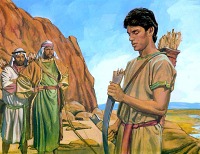
Nephi and his broken bow
“And it came to pass that as I, Nephi, went forth to slay food, behold, I did break my bow…we did return without food to our families… they did suffer much for the want of food.
And I said unto my father: Whither shall I go to obtain food?…And it came to pass that he did inquire of the Lord…I did slay wild beasts, insomuch that I did obtain food for our families…how great was their joy!”
I love this story. It makes me think of a group of fathers losing their jobs and coming home to tell their families that they don’t have the means to provide food for them. Some of them sit down and complain to their families, placing blame on others and cursing God for their misfortunes. “We deserve food!”, they may claim. “Haven’t we done what we were told?”
Then Nephi, in another great example of pure faith, does not complain – rather he speaks to the group, humbles them and goes and makes a new bow and goes to ask his father (the Prophet), “Where should I go to get food for us?”. Read the rest of this entry »

Seeds of every kind
“And it came to pass that we did gather together whatsoever things we should carry into the wilderness, and all the remainder of our provisions which the Lord had given unto us; and we did take seed of every kind that we might carry into the wilderness.”
Rather than bringing fruits and vegetables, they brought seeds. This indicates an intent to be in their new location for a long time, time enough to plant, grow and harvest. Seeds are a representation of future properity. They are an act in the “now” to prepare for a future.
Monetarily and finanically, we should likewise save for our future. Also, we should not just bury our savings under a matress, but save our money in a way that it can grow into something better and more useful in the future. Read the rest of this entry »
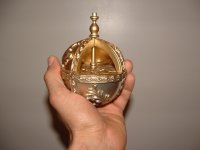
Liahona
“And it came to pass that as my father arose in the morning, and went forth to the tent door, to his great astonishment he beheld upon the ground a round ball of curious workmanship; and it was of fine brass. And within the ball were two spindles; and the one pointed the way whither we should go into the wilderness.”
The Liahona, in itself, is not an object of great worth. True, it is made of fine craftsmanship and brass, however, in the circumstances which Lehi’s family find themselves in, ornaments can be of little or no worth. Items of worth in this scenario would be food and survival items. However, the true value of the Liahona is its ability to point the way for them to go. It points the way to their future wealth.
Of course, we know that the Liahona is powered by righteousness and faith. Read the rest of this entry »
“And I beheld the Spirit of the Lord, that it was upon the Gentiles, and they did prosper and obtain the land for their inheritance;…
And it came to pass that I, Nephi, beheld that the Gentiles who had gone forth out of captivity did humble themselves before the Lord; and the power of the Lord was with them.”
We see here the promise given to Lehi early on in the Book of Mormon, that if he would “keep the commandments, ye shall prosper in the land” is made available to all who shall come to this land. Read the rest of this entry »
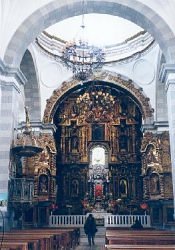
Gold adorned cathedral
“And I also saw gold, and silver, and silks, and scarlets, and fine-twined linen, and all manner of precious clothing; and I saw many harlots.
And the angel spake unto me, saying: Behold the gold, and the silver, and the silks, and the scarlets, and the fine-twined linen, and the precious clothing, and the harlots, are the desires of this great and abominable church.”
Nephi sees the formation of an abominable church whose desires are on riches and fine clothing. We can see this in a number of churches today who have large and marvelous cathedrals, most notably in Europe. They are adorned with gold in places, and built at a time when poverty was terrible. The priests would dress in very fine linens while impoverished people wore shredded, dirty cloth and were embarrassed to even enter the church. While the money that went into these spacious buildings and clothings for the Priests could have been used to help the poverty of the people – to save lives, the desired of that church were set upon money. Read the rest of this entry »
“And it came to pass that I beheld that the rod of iron, which my father had seen, was the word of God…”
We know the iron rod = the word of God. Why not a golden rod, showing a higher value of the word of God? How about a jewel encrusted rod?
Well, iron, although its not glitzy, it is strong, proven and known. Gold, while shiny and pretty, is not a strong metal. Also, iron is very plain, as is the word of God.
Likewise, we sometimes see glitsy advertising telling us about investment opportunities, multi-level marketing (MLM) schemes that are just too good to be true, trying to gain our attention. They are not going to lead to joy. They are not the iron rod. They ARE too good to be true. Stick to the iron rod, regular investments. Get rich slowly by keeping the commandments and working hard. Be smart with your money, but not overly risky, cause when its gone, its gone.
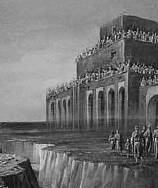
Great and spacious building
“And it was filled with people, both old and young, both male and female; and their manner of dress was exceedingly fine; and they were in the attitude of mocking and pointing their fingers towards those who had come at and were partaking of the fruit.”
It would be easy to paint a picture here about the filthy rich scoffing at the pious and humble followers of Christ, but I think that is not a fair portrayal of the facts. Back in the early days of Christianity, there was an ideology that Christians took a vow of poverty and the idea that money was inherently bad. Some took their example from John the Baptist, who chose a very basic life eating and wearing just the basics. As a matter of interest, just in the recent October 2008 General Conference, Elder L. Tom Perry encouraged a return to a simple life.
But a simple life doesn’t mean poverty. Read the rest of this entry »

